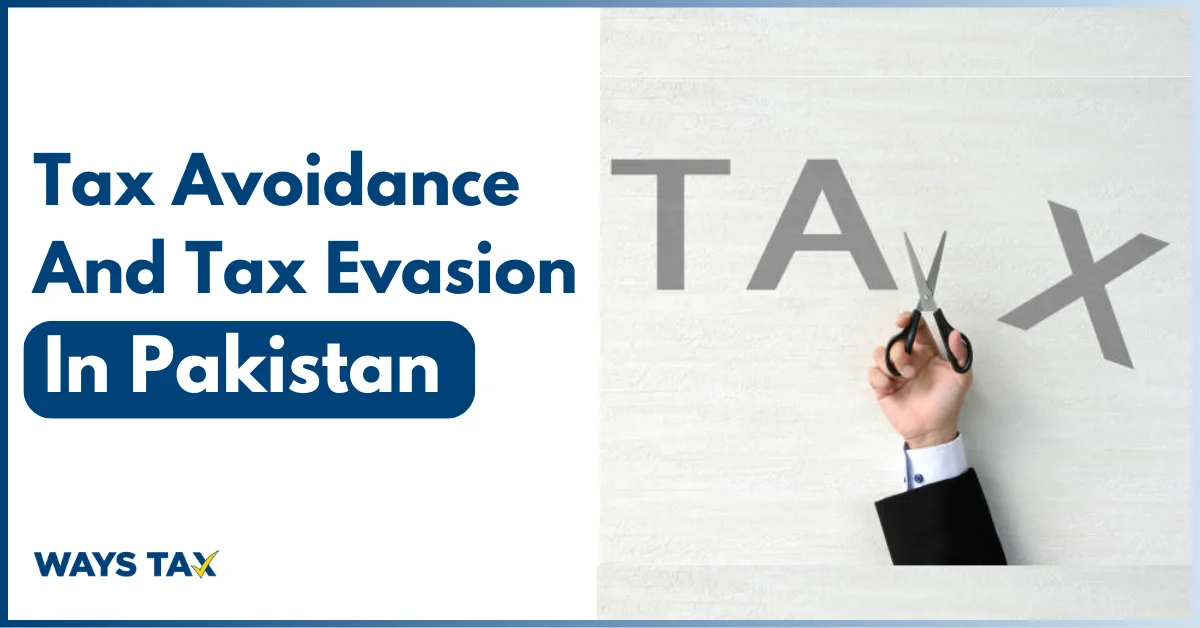What are the Differences between Tax Avoidance and Tax Evasion in Pakistan?
Navigating the world of taxation can be complex. For many in Pakistan, the lines between what is legal and what is not can seem extremely blurry. Two terms that often cause confusion are “tax avoidance” and “tax evasion.” While they both are to reduce tax liability, their methods and legal consequences are worlds apart…
Through this, you will learn the difference between tax avoidance and tax evasion in Pakistan. This guide will clarify these concepts, explore legal tax planning strategies, and highlight the severe risks associated with illegal practices.
5 Key Difference Between Tax Avoidance and Tax Evasion in Pakistan
| Aspect | Tax Avoidance (Legal) | Tax Evasion (Illegal) |
| Legality | Legal under Pakistani tax law | Illegal and punishable offense |
| Method | Uses deductions, exemptions, and provisions allowed by law | Involves fraud, concealment, or falsified records |
| Objective | Reduce taxable income within the framework of the law | Escape paying taxes altogether |
| Consequences | May face re-assessment if challenged but no criminal charges | Heavy fines, imprisonment, asset confiscation, and reputational loss |
| Perception | Considered smart financial planning | Considered a serious crime under FBR laws |
What is Tax Avoidance?
The skill of lawfully reducing your tax liability by utilizing all of the legal deductions, exemptions, and allowances is known as tax avoidance. It’s a clever and calculated method of handling finances.
The fundamental idea is to manage your finances in a way that minimizes your taxable income while adhering to the law. Consider it like following the rules of a game to win.
Key Takeaways
- Legality: This activity is lawful.
- Method: Makes use of applicable tax laws, exemptions, and deductions.
- The objective is to lower taxable income in order to lower the tax obligation.
- A reassessment and payment of the appropriate tax, but no criminal charges, may result from contesting an aggressive scheme.
How Does Tax Avoidance Work?
Tax avoidance works by adhering to the letter of the law, even if it goes against the spirit of it. A simple example is a business owner in Pakistan who carefully manages their business expenses.
They can lawfully lower their total earnings and, as a result, their tax liability by keeping track of and claiming all allowable deductions. This approach is completely compliant since the Federal Board of Revenue (FBR) acknowledges these deductions as acceptable business expenses.
For more insights on lawful tax-saving opportunities, check out this guide on Double Taxation Relief in Pakistan..
Challenges of Tax Avoidance
While tax avoidance is legal, it comes with certain challenges:
- FBR scrutiny: Plans that are too aggressive can be subject to examination.
- Laws against avoidance: The Income Tax Ordinance of 2001 contains provisions that guarantee taxes are based on actual economic reality rather than fictitious arrangements.
- Recharacterization risk: The FBR has the authority to reclassify a transaction if it does not have a legitimate business objective, which could result in increased tax obligations and fines.
- The weight of compliance: necessitates meticulous preparation, precise documentation, and open reporting.
Tips
- Always consult a qualified tax consultant or chartered accountant.
- Ensure strategies are effective yet compliant.
- For trusted professional help, visit Waystax.com
What is Tax Evasion?
In stark contrast to tax avoidance, tax evasion is a deliberate and illegal attempt to escape paying taxes. It is a criminal offense that involves fraudulent activities and the concealment of income or assets from the tax authorities.
The methods of tax evasion include:
- Underreporting income or sales.
- Falsifying financial records and accounts.
- Claiming false or inflated deductions and expenses.
- Hiding money and assets in undisclosed offshore accounts.
Is Tax Avoidance Legal?
Yes, tax avoidance is legal. It is an accepted practice within the framework of tax law. However, its legality can be a gray area, especially with aggressive schemes that push the boundaries of the law. The FBR has a number of anti-avoidance provisions to counter such schemes.
Severe Penalties
Tax evasion in Pakistan is a serious criminal offense with severe penalties. The FBR has strict laws and enforcement mechanisms in place. Penalties can include:
- Financial Fines: Substantial monetary fines, often a multiple of the evaded tax amount.
- Imprisonment: In severe cases, individuals can face prison sentences of up to several years.
- Confiscation of Assets: The FBR can seize and sell assets to recover the evaded tax amount.
FAQs
The Bottom Line
Understanding the difference between tax avoidance and tax evasion is significant for every taxpayer in Pakistan. While legal tax planning and avoidance are encouraged, tax evasion is a serious crime that carries severe consequences.
You can make sure you are helping the country flourish while also managing your money lawfully and ethically by being a conscientious and knowledgeable taxpayer.
Need expert guidance?
Waystax helps you plan taxes legally, efficiently, and with peace of mind.


